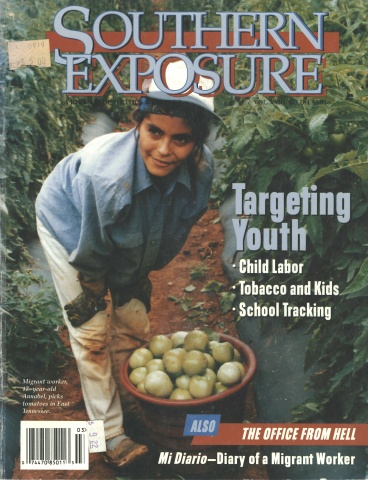Targeting Youth

This article originally appeared in Southern Exposure Vol. 23 No. 3 & 4, "Targeting Youth." Find more from that issue here.
“Save the Children.” “Save our Youth.” Few slogans have been as used or misused. Senator Bob Dole, a Presidential candidate, uses the slogan to crusade against Hollywood and to run for higher office. C. Delores Tucker, president of the liberal National Political Congress of Black Women, teams with conservative William Bennett and proposes to “Save the Children” from the “pornographic smut” of gangsta rap music. Even the proponents of the Republican’s Contract with America invoke images of saving the children while cutting social programs aimed at helping youth. As Senator Bob Dole mentioned in his attempts to prevent childhood inoculation funds from moving through the Congress, “this new immunization spending and hundreds of other spending and taxing programs would rob them (the children) of their full potential.”
What do all these examples have in common? Very little other than the invocation of slogans about saving children. But as David Futrelle wrote in In These Times, the slogan of “‘save’ the children, however irrelevant to the topic at hand, is designed to evoke a feeling of guilt, a vague sense of responsibility evaded. We are left to wonder how we, through our own self-indulgence, neglected the younger generation.”
But beneath the rhetoric of “Save the Children” lie ugly truths:
♦ According to recent census data, the number of U.S. children living in poverty increased by 2.2 million between 1979 and 1990.
♦ Despite stated efforts to save our children, politicians and others often depict youngsters as the cause of many societal ills including violence and rising teen pregnancy. However, a 1994 report by the media watchdog group Fairness and Accuracy in Reporting (FAIR) found that statistics do not support this position. According to FAIR, 83 percent of murdered children and 85 percent of murdered adults are slain by adults over 20, not kids. Furthermore, according to the U.S. Public Health Service, 71 percent of all teenage mothers have adult partners over 20.
♦ The Republican Contract With America will have a devastating effect on poor children, according to several reports by the Center on Budget and Policy Priorities, Families USA and Congressional Urban Caucus. Under the contract, 1,992,550 babies and preschoolers would lose WIC (Women, Infant and Children) nutrition supplements; 6,604,450 children would lose Medicare coverage, and at least 209,050 children would lose the federal child-care subsidies that enable parents to work or get education and training.
In this special section of Southern Exposure we attempt to get beyond the rhetoric about saving America’s youth and the political smoke and mirrors of the debate. We look at what is happening to young people. We explore the conditions of youth in the workplace and current attempts to roll back child labor protection laws. In the schools we look at tracking — or ability grouping — programs that lead to segregated classrooms and a two-tier school system — one white, one minority. We also examine the current debate over youth smoking and the tobacco industry’s attempts to target kids for their products. Also in this issue, America’s premier child advocate Marian Wright Edelman talks with us about the future of America’s youth under the new Republican Congressional majority. Finally, we profile youth groups from around the South that are engaged in real efforts to help themselves and to prepare a new generation for the reins of leadership.
This special section is not just about youth; it is by young people. All of the writers, except one, are 30 and under (except for one and he wants to remain anonymous).
Angela Brown, director of the Youth Task Force and Southern Toxic campaigner for Greenpeace told me, “Too many of us face the epidemic of drugs, the culture of violence, the sin of racism, the pain of miseducation, the divisiveness of classism and lack of commitment to end sexist oppression.” She has a mission for her fellow young people: “To work in and with and for the liberation of our communities. Our battle cry is always the same — ‘A call to struggle.’ We call on all young sisters and brothers to become actively engaged in that struggle to liberate our people, our communities, ourselves, and the future generation.”
As the people who are profiled in this section — and the writers — show, many of the youth across the South are dedicated to the work of liberation.
Tags
Ron Nixon
Ron Nixon is the former co-editor of Southern Exposure and was a longtime contributor. He later worked as the homeland security correspondent for the New York Times and is now the Vice President, News and Head of Investigations, Enterprise, Partnerships and Grants at the Associated Press.